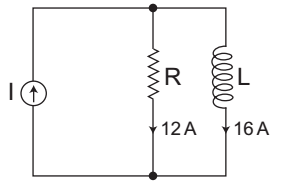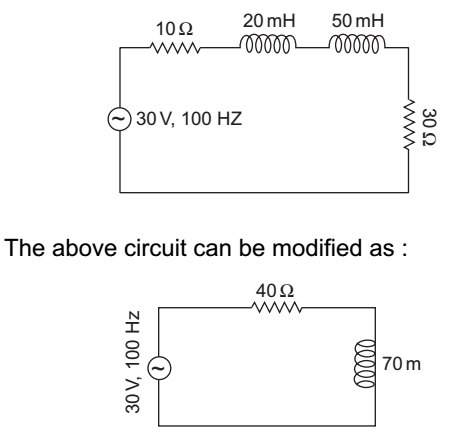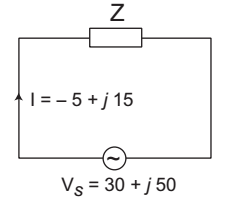Network theory miscellaneous
- For the circuit shown below, the current supplied by the sinusoidal current source I is—

-
View Hint View Answer Discuss in Forum
The given circuit:

The current supplied sinusoidal current source
I = IR2 + IL2
or
I = 122 + 162 = 144 + 256
= 400 = 20A.Correct Option: C
The given circuit:

The current supplied sinusoidal current source
I = IR2 + IL2
or
I = 122 + 162 = 144 + 256
= 400 = 20A.
Direction: Statement for Q. 103 to Q. 105. A signal generator supplies a sine wave of 20V, 5kHz to the circuit shown below—

- The phase angle of the circuit—
-
View Hint View Answer Discuss in Forum
Phase angle,
φ = tan–1 XC R
orφ = tan–1 0·126 = 33° 0·2 Correct Option: A
Phase angle,
φ = tan–1 XC R
orφ = tan–1 0·126 = 33° 0·2
- The total impedance of the circuit—
-
View Hint View Answer Discuss in Forum
Total impedance of the circuit,
ZT = Vs = 20 0° IT 0·24 × 33°
= 83.3 -33°Ω
Correct Option: B
Total impedance of the circuit,
ZT = Vs = 20 0° IT 0·24 × 33°
= 83.3 -33°Ω
- The phase angle for the circuit shown below is—

-
View Hint View Answer Discuss in Forum
The given circuit:

From above circuit,
XL = 2πf L = 2 × 3·14 × 100 × 70 × 10–3
= 43·98Ω
Now,
Zeq = (40 + j43·98)Ω
Current,I = Vs = 30 0° Zeq 40 + j43·98
≈ 0·5 – 47·7°A
Thus, we conclude that current lags behind the applied voltage by 47·7°. Hence the phase angle between voltage and current, θ = 47·7°.Correct Option: A
The given circuit:

From above circuit,
XL = 2πf L = 2 × 3·14 × 100 × 70 × 10–3
= 43·98Ω
Now,
Zeq = (40 + j43·98)Ω
Current,I = Vs = 30 0° Zeq 40 + j43·98
≈ 0·5 – 47·7°A
Thus, we conclude that current lags behind the applied voltage by 47·7°. Hence the phase angle between voltage and current, θ = 47·7°.
- The given circuit is a combination of—

-
View Hint View Answer Discuss in Forum
The given circuit:

The impedance of the given circuitZ = 30 + j50 = 30 0° = 58·31 59° I – 5 + j15 15·81 – 108·43°
= 3·69 – 49·43° or Z = (2·4 – j 2·8)Ω
Therefore, the circuit has a resistance of 2·4Ω in series with capacitive reactance 2·8Ω.Correct Option: A
The given circuit:

The impedance of the given circuitZ = 30 + j50 = 30 0° = 58·31 59° I – 5 + j15 15·81 – 108·43°
= 3·69 – 49·43° or Z = (2·4 – j 2·8)Ω
Therefore, the circuit has a resistance of 2·4Ω in series with capacitive reactance 2·8Ω.

